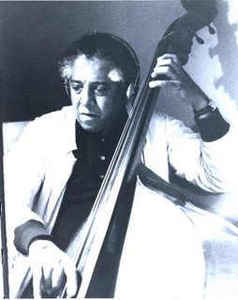|
The Kindness of John Neves
As Told by Terry MacDonald The bassist John Neves, who died way too young in 1988 at the age of just 57, was a Boston jazz institution. Perhaps most remembered for his presence in the Herb Pomeroy big band from 1954 to 1983, he also played locally and rather famously for many years with the legendary drummer Alan Dawson in a trio that included his brother, pianist Paul Neves, at Club 47 Mt. Auburn in Harvard Square. When drummer Tony Williams was growing up in Boston, and before he joined Miles, he and John used to jam together—just bass and drums, mentor and protegé. Beyond the Boston area, John played with such notables as Roy Haynes, George Shearing, Gerry Mulligan, Marian McPartland, and Stan Getz. John, in fact was the bassist on the classic Getz recording Focus, which was composed and conducted by Eddie Sauter. At the time of his death, John had been teaching at Berklee for 13 years. John Neves was a friend of mine. Really. (I know, I had to pinch myself.) Even better, we used to jam together with a group of mutual musician friends at the Hull, Massachusetts, home of tenor saxophonist Corso Donati, a great friend of both John and myself. It speaks to John’s generosity as a musician and as a human being that he was willing to share the bandstand with an avocational drummer like myself. This story is an example of that generosity. We had been playing one day at Corso’s and, after a number of tunes, we were taking a break. I was always tense and, frankly, insecure playing with John and some of the others at those sessions. And that day, I wasn’t exactly feeling great about my drumming. “Sorry about my time today, John,” I apologized. “Your what?” “My time,” I said. “I don’t think it’s been very consistent.” “Hey, hey, hey, wait a minute!” he said. “Who appointed you timekeeper?” Me: “Uh-uh-uh, WHAT?” Something like that. “Let me tell you something, Terry” he began. “Keeping the time is not your responsibility, it’s a shared responsibility, a collective decision.” (I remember his exact words.) “ If the tempo picks up in the course of a tune, it’s because we all made a collective decision that the tempo should be a little brighter. And if the tempo slows down some, it’s because we made a collective decision to bring it down.” And here it comes: “You’re not a timekeeper,” John told me. “You’re a tap dancer!” A tap dancer! A tap dancer? The words came into my consciousness like a fresh breeze. Suddenly I felt I was being freed. Here was John giving me permission to stop thinking so damn much about what I was doing and to enjoy the music, to be part of the music, to dance to it, to be a part of what the whole band was playing. John’s words didn’t make me a great drummer, of course. But they did make me a more relaxed one, and—dare I say it?—maybe even a more musical one. Thank you, my friend. |
Copyright ©2024 Seacoast Jazz Society, All Rights Reserved



